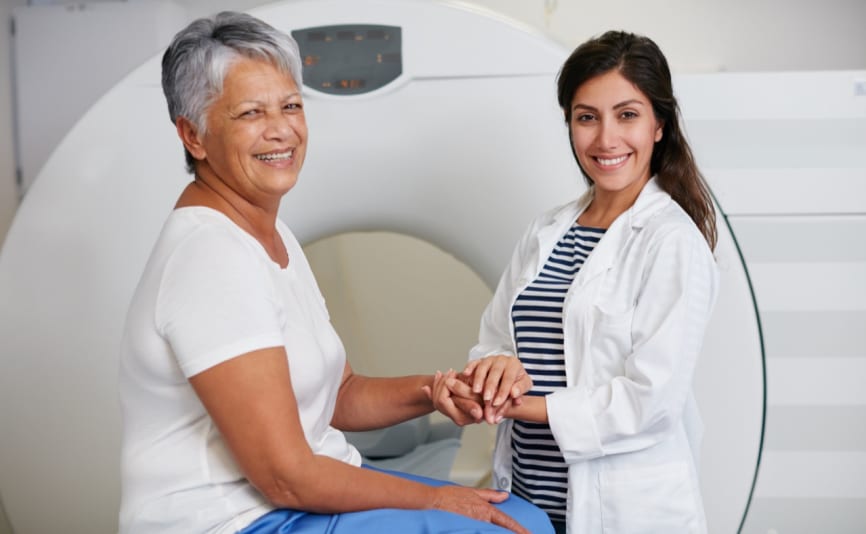💡 MRI scans are one of the safest medical imaging techniques, but they are not suitable for everyone. If you have any metal within your body or are pregnant, our team can help you to understand whether an MRI is the best option for you.}
While the scan itself is not dangerous, there are several things you should know beforehand, to make sure you have a safe and comfortable MRI experience:
-
The scanner’s magnetic field is 3000 times stronger than a fridge magnet, so it can attract metal objects and affect some medical devices.
It is important to tell our team if you have any medical implants, plates and screws, shrapnel in your body, or a pacemaker or artificial heart valve, as these could affect your suitability for an MRI scan.
You’ll also need to remove piercings, watches and jewellery before your scan. You might be surprised to learn that some tattoo inks and makeup products can also contain metallic particles, which could be affected by an MRI scan, so it is worth discussing tattoos with your consultant.
-
If you have a fear of confined spaces (claustrophobia), an MRI scan can be unsettling.
Traditional MRI scanners resemble a large tube, and you are asked to lie very still on a flat bed that will be moved into the scanner. Depending on the body part being scanned, you may enter the scanner feet first or head first.
You are able to speak to your radiographer throughout the scan for support, and you can listen to music if it helps to calm your anxiety. MRI scanners produce loud noises as the electronic currents are switched on and off, so earplugs or headphones are provided.
There are newer open MRI scanners available. These scanners have open sides, which may be more comfortable if you feel anxious about the scanning process.
-
For some MRI scans, you might need a contrast agent administered through an IV.
A contrast medium is a chemical substance such as gadolinium, which improves the quality of MRI images, and allows your radiologist to view your body and report their findings with greater accuracy.
Contrast media may cause mild side effects in some people, such as headache, nausea, and a warming sensation, but these usually subside quickly. Allergic reactions to contrast agents are extremely rare, but you should seek medical advice if you experience shortness of breath or a rash after your scan.
-
If you are pregnant, it is recommended that you do not undergo an MRI scan within your first trimester.
This is only precautionary, as MRI scans have no proven risks to pregnant women and their unborn babies. In many cases, MRIs are the safest method of gaining a medical view of both the mother and the developing baby.
However, gadolinium-based contrast agents are not routinely given to pregnant patients, but in some cases, the benefits of an MRI scan outweigh the risks.
Sources
- https://www.nibib.nih.gov/science-education/science-topics/magnetic-resonance-imaging-mri
- https://patient.info/treatment-medication/mri-scan#nav-3
- https://queensquare.com/article/is-mri-safe/
- https://www.symmetrymagazine.org/article/december-2008/deconstruction-mri
- https://www.radiologyinfo.org/en/info/safety-contrast#:~:text=The contrast material used in,experience hives and itchy eyes
- https://www.radiologyinfo.org/en/info/safety-mri-pregnancy
- https://www.nhs.uk/conditions/mri-scan/
- https://www.clinicaladvisor.com/home/topics/ob-gyn-information-center/mri-safe-in-early-pregnancy-gadolinium-use-linked-to-adverse-outcomes/
- https://mothertobaby.org/fact-sheets/magnetic-resonance-imaging-mri/
- https://www.insideradiology.com.au/gadolinium-contrast-medium/






